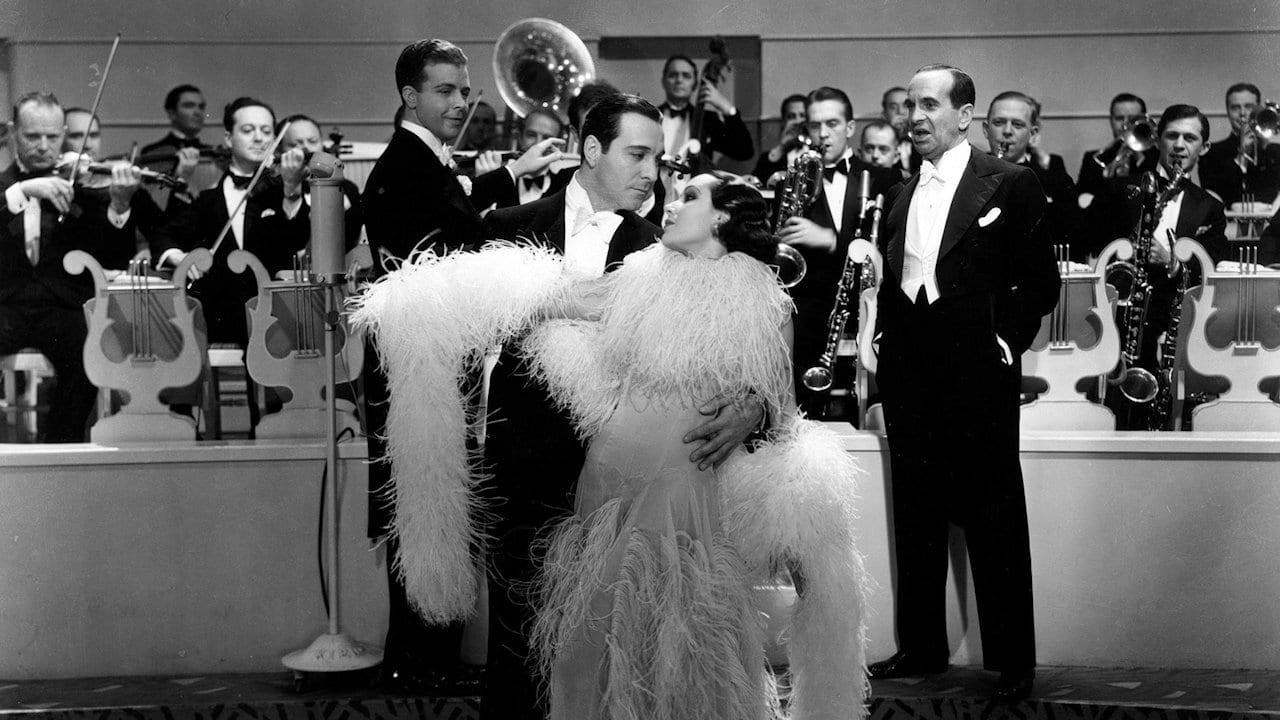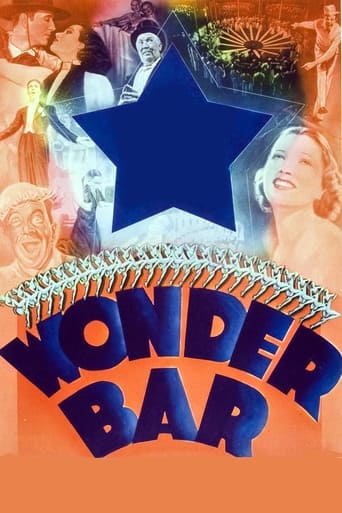

Director: LLOYD BACON. Screenplay: Earl Baldwin. Based on the 1929 German play by Geza Herczeg and Karl Farkas, as adapted by Irving Caesar and Aben Kandel, with music by Robert Katscher. Photographed in glistening black-and-white by Sol Polito. Film editor: George Amy. Art director: Jack Okey. Costumes: Orry-Kelly. Associate producer: Robert Lord. Producer: Charles Einfeldt.Musical numbers created and directed by BUSBY BERKELEY. Songs: "I'm Going to Heaven on a Mule" (Jolson), "Don't Say Good Night" (Powell), "Vive la France" (Jolson), "Tango del Rio" (danced by Del Rio and Cortez), "Why Do I Dream Those Dreams?" (Powell), "At the Wonder Bar", "Dark Eyes", "Fairer on the Riviera" all by Harry Warren (music) and Al Dubin (lyrics). Music director: Leo F. Forbstein. Copyright 23 February 1934 by First National Pictures, Inc. Released through Warner Bros Pictures. New York opening at the Strand: 28 February 1934. U.S. release; 26 November 1933. Australian release: 12 December 1934. 84 minutes.SYNOPSIS: Al Wonder (Al Jolson) is the egocentric owner of the Wonder Bar, a super-popular nightclub for the well-to-do. The Bar's number two draw-card (Al himself, of course, is number one), is a hot Latin dance team (Dolores del Rio and Ricardo Cortez). NOTES: Number 9 at domestic ticket-windows. Film debut of Hal LeRoy.COMMENT: "Wonder Bar" is a must-see, not only because of its fabulous cast, but because the musical interludes were created and directed by Busby Berkeley. In fact, they are probably Buzz's most famous sequences. Seemingly utilizing thousands of dancing extras in dazzling formations, the songs are imaginatively shot (often, as we might expect, from overhead), incorporating some of the most dazzling special effects. The rest of the film is handled by Lloyd Bacon in an extremely competent style. Bacon draws some great performances from the more animated-than-usual Jolson and absolutely terrific Del Rio. It is the beautiful Kay Francis who disappoints. She looks great, but her performance seems a little too pat, too well rehearsed to be really convincing. But surrounded by players at the top of their game, like Cortez, Powell, Kibbee and Donnelly, who cares? AVAILABLE on a superb Warner DVD.
... View MoreI am very fond of Al Jolson, But the only film I have seen with him in it is this one. I like it quite a lot but I found it very strange; what the hell was a murder story doing in a 1930's musical? Well never mind about that, just enjoy the rest of the film, with its fantastic score by Harry Warren (music) and Al Dubin (lyrics). But there is yet another thing which I wasn't particularly fond of in this film which was Dick Powell who, I think, is overrated. If you don't like minstrels then don't see this film (it has Al Jolson in it). Despite being a great lover of music, I am not terribly fond of some of Busby Berkely's stuff, His dance sequences for example, tend to be a bit over-long. Despite the handicaps that I have written here, this film is very watchable. Enjoy. 8/10
... View More'Wonder Bar' stars Al Jolson in a film with more plot than usual, and it's one of his best efforts. Jolson's films are notoriously tainted by racist blackface routines: in 'Wonder Bar', this material is completely avoided until the very end of the film, when we get a long blackface number called "Goin' to Heaven on a Mule". If you fast-forward through this to get to the last few minutes of the film (tying up some loose ends in the plot), you'll be better off.Several Warner Brothers movies of this period ('Two Seconds', 'Central Park') featured a 'book-ends' structure in which the film's opening shot and closing shot are the same camera set-up. We get a variation on that structure here. The first couple of reels of 'Wonder Bar' set up the conflicts between the characters. Then, about a third of the way into the film, we get the first 'book-end' as Jolson's nightclub (the Wonder Bar) opens for the evening: a liveried doorman unrolls a red carpet and salutes us. At the very end of the film, after the Wonder Bar has closed for the night, the doorman rolls up the carpet and salutes us again.I'm a long-time fan of Dolores del Rio, an immensely talented actress who was also exceedingly sexy. Here, she gives the best (and sexiest) performance I've ever seen from her, as a cabaret dancer who is bullied and exploited by her dance partner (the very hissable Ricardo Cortez). Jolson is in love with del Rio (this is cleverly depicted with an unusual visual device), but she doesn't return his love.Dick Powell is less annoying and less obtrusive than usual. Ditto the raccoon-eyed Kay Francis, whom I always dislike. SPOILERS COMING. There's an amusing subplot with four Warners stalwarts (Guy Kibbee, Hugh Herbert, Louise Fazenda and the splendid Ruth Donnelly) as two stodgy married couples on holiday. The husbands conspire to sneak out for a night on the tiles while the wives are asleep; the wives plot to sneak out while the husbands are asleep. Unfortunately, after setting up this very funny situation, there's no pay-off for it.Veteran character actor Robert Barrat plays a role well outside his usual range, with only partial success. Somewhat implausibly, Jolson allows Barrat to commit suicide because this will help Jolson conceal a murder committed by del Rio. We're meant to admire Jolson for this.I shan't comment on the protracted blackface routine late in the film, except to say that it's a *dull* number apart from its offensiveness. The effeminate tap-dancer Hal LeRoy performs, nearly naked, in blackface and full body make-up. Instead of painting a white man to look like a black man, couldn't Warners have hired a black tap-dancer instead? Plenty of black men were much better dancers than Hal LeRoy.Much earlier in the film, there's one very surprising gag involving Jolson and two gay men. During his long career as a stage performer, Jolson frequently worked 'lavender' material into his act. Like the British comedian Max Miller, Jolson was a heterosexual performer who deliberately led audiences to suspect he might be homosexual. (Apparently the rumours were good for the box office.) Jolson employed 'camp' humour and gay jokes frequently onstage, but so far as I know 'Wonder Bar' is the only time he ever did this in a film. I'll rate 'Wonder Bar' 8 points out of 10. I was tempted to knock off several points for the blackface routine, but I put them back on again for Dolores del Rio's very erotic performance.
... View MoreJolson's Al Wonder is a cross between Rufus T. Firefly and an early blueprint for Bogart's Rick in CASABLANCA (he owns a club, he fixes everybody's problems, he's hopelessly in love with a woman (del Rio) who's attached to somebody else, and he's an American living in a foreign city -- Paris, in this case).Ricardo Cortez and Dolores del Rio display mannerisms typical of actors still in transition from the silent era. They both bring some magnetism to the screen, as do Kay Francis and Dick Powell. The comedy thread, featuring Guy Kibbee, Ruth Donnelly, Hugh Herbert and Louise Fazenda as two American couples determined to take advantage of the sexual exoticism of Paris, gets a little thin.It's a well made film, although clearly dated, and with some interesting moral ambiguity. Its limits as art and as entertainment are transcended during two sublime Busby Berkeley sequences: the first a typically dazzling choreographic gem emerging from a Cortez/del Rio dance routine; and the second, equally impressive, but bizarre, following Jolson in blackface going up to Heaven on a mule, during which Jolson seems to want to add Cab Calloway to his character's identikit.It's to Lloyd Bacon's (and the cast's) credit that the contrivances of the plot don't dull the film's impact too much, but it is only when BB's magic unfolds that WONDER BAR becomes exceptionally good.
... View More